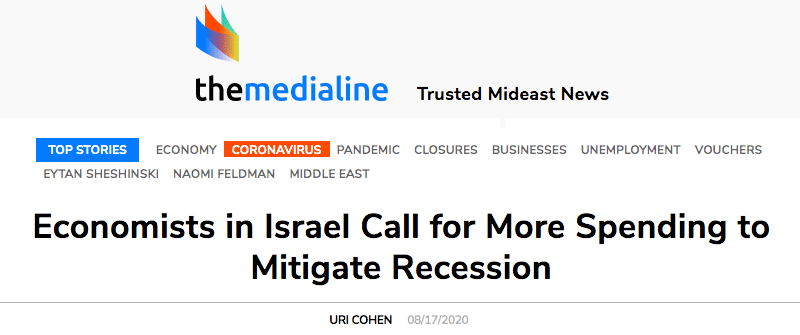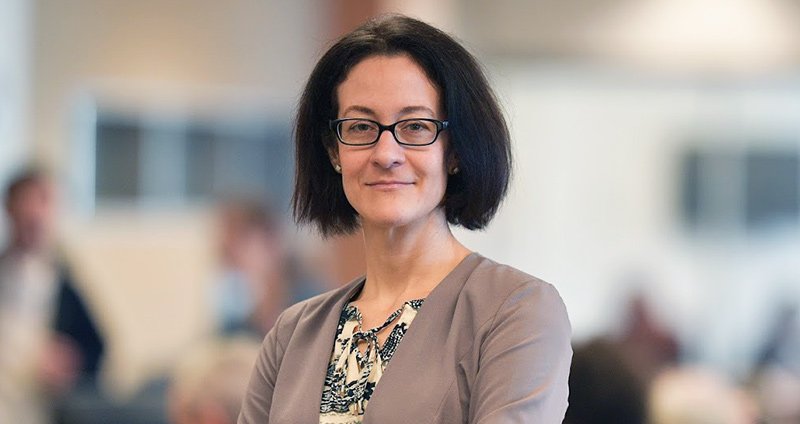Editor’s note: Prof. Eytan Sheshinski is the Sir Isaac Wolfson Professor of Public Finance Emeritus at Hebrew University, and Prof. Naomi Feldman is an Associate Professor of Economics in the Dept. of Economics there.

Central Bureau of Statistics shows economy with worst numbers in decades

Experts called for more spending to boost Israel’s economy amid the COVID-19 crisis after the Central Bureau of Statistics said the country had plunged into its worst recession in more than 40 years during the second quarter.
“The government needs to focus on strengthening people’s purchasing power and getting them to go out and shop,” Prof. Eytan Sheshinski, who formerly chaired the Israeli Economic Association and several special economic committees advising Israeli lawmakers, told The Media Line.
Sheshinski suggested that Israelis be given “vouchers to be used exclusively for purchasing goods, services, etcetera,” he said. “That will spur growth.”

Prof. Naomi Feldman, who has been advising Prime Minister Binyamin Netanyahu in recent weeks and who used to be the principal economist for the US Federal Reserve’s board of governors, agrees.
“We need to spend more upfront,” she told The Media Line. “The more money we put into solving the problem right now, the shorter that second phase, the recovery, will be.”
Israel’s gross domestic product (GDP) shrank at an annualized rate of 28.7% from April to June, the statistics bureau announced on Sunday. Tourism, real estate and imports-exports were the sectors hit hardest.
Minutes after the numbers were made public, Netanyahu released a video in which he said the nearly 7.2% second-quarter contraction was less extreme than what some European countries had suffered.
“It’s true that we are in better shape than many-to-most countries in the developed world, but it’s still bad,” Feldman, an economics professor at the Hebrew University in Jerusalem who has also been a senior economist on US President Donald Trump’s Council of Economic Advisers, said.
“This isn’t a great shock or surprise, either. We didn’t necessarily expect this number, but we all knew it was going to be bad. This is something that every developed country in the world is going through right now,” she explained.

Sunday’s numbers “are definitely very concerning, but it seems we’ve mostly gone through the worst of it,” Feldman continued. “There’s nothing at this point to suggest to me that we’re going to be worse off than the period when completely shut down.”

She points to the growing number of stores that are opening their doors, the planned gradual reopening of theaters and concert venues, and the uptick in local tourism as positive trends that, if they continue uninterrupted, should help the country’s economy recover sooner rather than later.
“It won’t be blockbuster growth in the third quarter,” she said, “but for sure not worse, unless something drastic changes.”
Sheshinski is less upbeat.

“There was no basis for the optimism in the first round ,” he went on. “The lockdown caused major damage to the economy, and they didn’t correctly evaluate the consequences.”
Along with the historically low GDP growth figures, Israel’s unemployment rate continues to concern policy-makers. While the precise numbers are not clear – different government agencies give different figures – somewhere between 12% and 22% of Israelis are out of a job.
Government grants totaling nearly $2 billion, given to companies over the past few months to stimulate employment and support the rehiring of workers, have not led to the desired results at the desired pace. Nor has the deposit of hundreds of shekels in each Israeli’s bank account.
Feldman believes there is one issue that is most critical to improving the economy, and that is the pandemic itself, which should be given the most attention” at this point.
“There’s this cloud over the economy right now, and once that is solved and we move on to the second stage, the economy will open up,” she stated.
At that point, it would be “more akin” to a typical recession.
“A lot of these problems solve themselves,” she said.
Meanwhile, Feldman recommends investing heavily in infrastructure projects and retraining unemployed people so that the economy will be better positioned for the day after.
“If gets lazy and neglectful, we might have a very long recovery,” she warned.
“Talking to business owners, I think people felt like they were being neglected,” she went on. “There were many, many months where not much was being done.”
She says the Netanyahu government now seems “more serious” in its handling of the issue.
“We need to spend more up front,” Feldman concluded.
